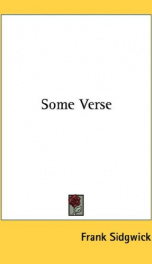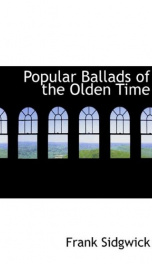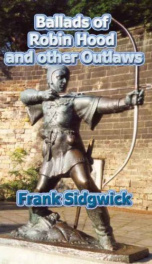Ballads of Mystery and Miracle and Fyttes of Mirth

PREFACE The issue of this second volume of Popular Ballads of the Olden Time has been delayed chiefly by the care given to the texts, in most instances the whole requiring to be copied by hand. I consider myself fortunate to be enabled, by the kind service of my friend Mr. A. Francis Steuart, to print for the first time in a collection of ballads the version of the Grey Selchie of Shool Skerry given in the Appendix. It is a feather in the cap of any ballad-editor after Professor Child to discover a ballad that escaped his eye. My thanks are also due to the Rev. Professor W. W. Skeat for assistance generously given in connection with the ballad of Judas ; and, as before, to Mr. A. H. Bullen. ??F. S. an excerpt from: BALLADS IN THE SECOND SERIES The ballads in the present volume have been classified roughly so as to fall under the heads (i) Ballads of Superstition and of the Supernatural, including Dirges (pp. 1-122); (ii) Ballads of Sacred Origin (pp. 123-154); (iii) Ballads of Riddle and Repartee (pp. 155-181); and (iv) a few ballads, otherwise almost unclassifiable, collected under the title of 'Fyttes of Mirth,' or Merry Ballads (pp. 182 to end). I That the majority of the ballads in the first section are Scottish can hardly cause surprise. Superstition lurks amongst the mountains and in the corners of the earth. And, with one remarkable exception, all the best lyrical work in these ballads of the supernatural is to be found in the Scots. Thomas Rymer, Tam Lin, The Wife of Usher's Well, Clerk Sanders, and The D?mon Lover, are perhaps the most notable examples amongst the ballads proper, and Fair Helen of Kirconnell, The Twa Corbies, and Bonnie George Campbell amongst the dirges. All these are known wherever poetry is read. ??'For dulness, the creeping Saxons; ??For beauty and amorousness, the Gaedhills.' But the exception referred to above, The Unquiet Grave, is true English, and yet lyrical, singing itself, like a genuine ballad, to a tune as one reads. The complete superstition hinted at in this ballad should perhaps be stated more fully. It is obvious that excessive mourning is fatal to the peace of the dead; but it is also to be noticed that it is almost equally fatal to the mourner. The mourner in The Unquiet Grave is refused the kiss demanded, as it will be fatal. Clerk Sanders, on the other hand, has lost?if ever it possessed?any trace of this doctrine. For Margret does not die; though she would have died had she kissed him, we notice, and the kiss was demanded by her and refused by him: and Clerk Sanders is only disturbed in his grave because he has not got back his troth-plight. The method of giving this back?the stroking of a wand?we have had before in The Brown Girl (First Series, pp. 60-62, st. 14).
Info about the book
Author:
Series:
Unknown
ASIN:
B0082X8J1Y
Rating:
5/5 (5)Your rating:
0/5
Languge:
English
Users who have this book
Users who want this book
What readers are saying
What do you think? Write your own comment on this book!
write a commentif you like Ballads of Mystery and Miracle and Fyttes of Mirth try:
Do you want to exchange books? It’s EASY!
Get registered and find other users who want to give their favourite books to good hands!





